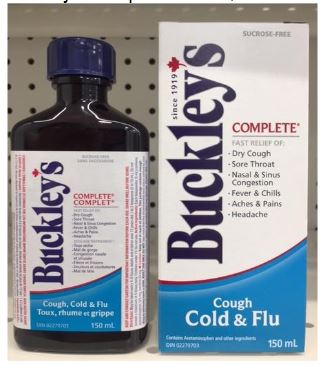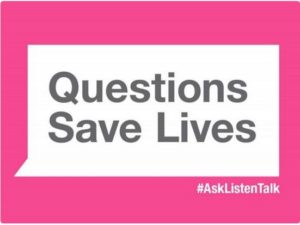
Do you use Buckley’s syrup products for colds and coughs? If so, Health Canada is advising all Canadians that GlaxoSmithKline (GSK) Consumer Healthcare Inc. has initiated a voluntary recall of certain Buckley’s products. According to the advisory, the plastic seal on the top of the bottle can come detached and fall into the bottle. (See pictures below.) This, in turn, can present a chocking hazard if swallowed. To read the complete recall, including a list of affected products, click here.

Tag Archives: patient safety
Let Your Voice Be Heard

On Tuesday, February 28th, Red Deer doctors held a public meeting to discuss the deficiencies at the Red Deer Regional Hospital.and the impact they were having on patients and the care they received. In 2014, there was a plan to address these issues, which included redeveloping the hospital. However, in late 2016, Alberta Health Services removed this redevelopment plan from its list of priorities. This they did even though the Red Deer Regional Hospital is the fourth busiest in the province, is in need of “96 more admitting beds, 8 more emergency room beds and three more operating rooms.” In a notice issued by the doctors, “‘If you find the treatment of central Albertans by policy-makers and government unacceptable and unfair, let your voice be heard.'” Click here to read more.
Restraints as a Last Resort
“There’s a new provincial policy soon to be released in Alberta, ‘Restraint as a Last Resort,’ that will limit use of restraints to the least restrictive, as a last resort. There is a belief that lap belts in chairs keeps people safe (they fasten from behind), but the experience of being restrained is distressing – and can actually lead to more injurious falls and increased antipsychotic use. In addition, the restrained person can’t get to the bathroom, and may experience skin breakdown, loss of muscle strength, loss of independence and delirium (an acute brain injury).” Verdeen Bueckert, Practice Lead with the Seniors Health Clinical Network
Click here to read how an orthopedic team in Alberta reduced the use of restraints by 84%!
What is QI?
The use of acronyms and abbreviations is common in many areas, including healthcare. One acronym often found in written material and heard in conversations is QI. However, what does QI mean? Health Quality Ontario created the following video that highlights the key points of the QI – Quality Improvement – as it relates to healthcare. More specifically, what does QI mean in healthcare and why should we care about it? If you have not seen the video, you may wish to do so.
Get Involved!

Are you interested in promoting and improving the safety and quality of Alberta’s healthcare system? Do you want to see changes in this area? If so, the Health Quality Council of Alberta is looking for volunteers to join its Patient/Family Advisory Panel. Click here for more information.
Ask a Question
Did you know that more than 100,000 Canadians are unintentionally harmed during hospital stays in 2014-2015? Unfortunately, some of these incidents result in permanent damage or even death. To help increase patient safety, the Canadian Patient Safety Institute has initiated a campaign called the “Questions Save Lives Campaign.” What question would you ask your doctor to make your health care safer?

Click here to find out more about the campaign and how you can get involved.
Clinical Trials – To Participate or Not

Clinical trials are becoming more popular and as such, the demand for participants is increasing. Unfortunately, oft times patients who are being asked to participate or are considering joining are unclear about the nature of the study and what their involvement would entail. This, in turn, makes deciding whether or not to get involved in the study more difficult.
To address this issue, The Center for Information & Study on Clinical Reseach Participation has a number of questions on its website that may be of assistance to individuals contemplating clinical trial involvement. Here are five of the questions they list.
1. What is the main purpose of this study?
2. Does the study involve a placebo or a treatment that is already on the market?
3. How will the treatment be given to me?
4. How long is the study going to last and what will I be asked to do as a participant?
5. What has been learned about the study treatment and are any study results published?
To reading the list, click here. What, if any, questions would you add to this list?
Alberta Health Services – Four Strategies
“AHS [Alberta Health Services] put out a nice video with a succinct description of how patients and families are at centre of their work. I quite liked it.. Have a look if you are interested.” – Troy, a member of the Pts4Chg community.
Before you pop that Tylenol….
Do drug manufacturers know the effects their products have on our bodies? While we may assume that they do, according to Luke Timmerman and Meg Tirrell, this is not necessarily the case. Click here to listen to their podcast
Uncovering Medical Errors
According to a recent study done by researchers at John Hopkins University, the number of inpatient deaths from medical errors have increased. With 251,000 error-based inpatient deaths occurring each year in the US, only heart disease and cancer cause more fatalities.
It is time to implement more aggressive measures to combat this epidemic of medical errors, even a measure that undoubtedly would not sit well with doctors, hospitals and, most certainly, their liability insurance carriers. But it is a measure that the health care industry should embrace if its No. 1 priority truly is patient safety. What is this measure? Doing away with keeping secret from the public the findings of hospital peer review committees.
Click here to read the full article.


